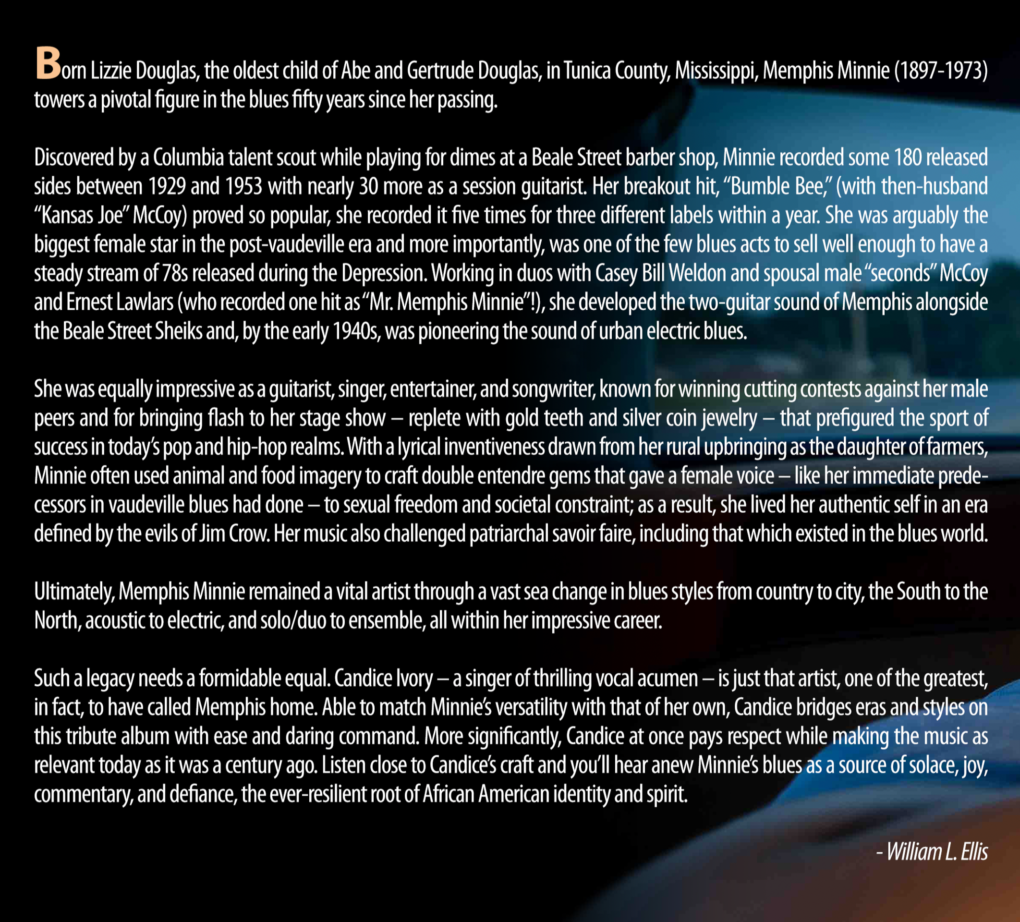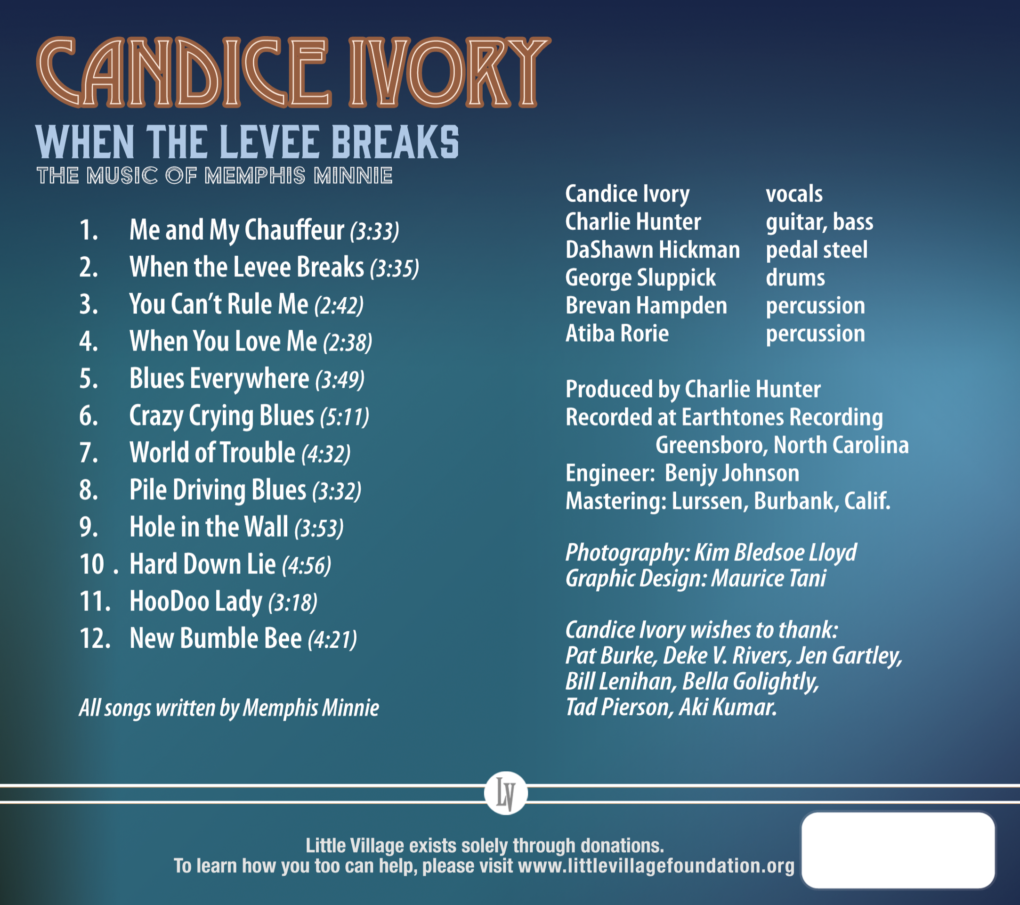Candice Ivory Presents
When the Levee Breaks: The Music of Memphis Minnie
• Featuring 2x Grammy-Nominated Producer/Guitarist Charlie Hunter
• Best Blues Album of 2023: Bayou Blue Radio (FR), Blues 21 (FR), Jefferson (SE), Les temps du blues (FR), Memphis Flyer (US), Roots Music Report (US), Soul Bag (FR)
• Nominated for Best Emerging Artist Album: Blues Music Awards (US)
• #2 Blues Album of 2023: Il Popolo del Blues (IT)
• #3 Blues Album of 2023: Blues Bytes (US), MOJO (UK)
• #6 Blues Album of 2023: Crossroads (US)
• #17 Tribute Album of 2023: Cover Me (US)
• #31 Blues Album of 2023: Living Blues (US)
• “You Can’t Rule Me”: Most Memorable Blues Track of 2023: KNKX (US)
After releasing three acclaimed albums of jazz-driven original songs, vocalist Candice Ivory reveals a whole new sound on When the Levee Breaks: The Music of Memphis Minnie. Raised in Memphis and based in St. Louis, Ivory hails from an illustrious musical family that shaped Memphis’s secular and sacred sounds. Her great-uncle was the singer and guitarist Will Roy Sanders of the Fieldstones, one of the premier Memphis blues bands from the 1970s to the 1990s. Ivory grew up in the church, and by the age of eleven, she was singing in a choir that featured the soon-to-be-famous R&B artist D’Angelo. When the Levee Breaks brings together all of her formative musical experiences in a tribute to Memphis Minnie (1897-1973), whose powerhouse vocals and compositional creativity served as inspiration for Ivory’s own innovations as the Queen of Avant Soul. Produced by singular guitarist/bassist Charlie Hunter, a onetime D’Angelo collaborator, Ivory’s When the Levee Breaks is a midnight run to the crossroads, where jazz, blues, gospel, and R&B all converge.
Candice-Ivory-When-the-Levee-Breaks-The-Music-of-Memphis-MinnieImages from the album


















photographs by Kim Bledsoe Lloyd, Bella Golightly, and Deke V. Rivers
Singles from the album
After three jazz albums, the St. Louis-based vocalist Candice Ivory debuts a new sound on When the Levee Breaks, a tribute to the legendary Memphis Minnie (1897-1973), produced by guitarist/bassist Charlie Hunter. On “World Of Trouble,” featuring several percussionists and pedal steel player DaShawn Hickman, she demonstrates why she is called the Queen of Avant Soul.
—Miquel Botella Armengou, Ciudad Criolla
The term “Memphis Minnie cover” doesn’t begin to do justice to arrangements that are varied in their jazz, gospel, and R&B influences. It is a credit to Memphis Minnie, Candice Ivory, Charlie Hunter, and Little Village that lives up to any expectations blues fans may have as to what to expect from this combination of talents.
—Don Wilcock, Blues Music Magazine
Jazz vocalist and composer Candice Ivory released When the Levee Breaks, a tribute to pioneering blues matriarch Memphis Minnie. 2023 marked the 50th anniversary of the performer’s death, so Ivory’s project is well timed. The earliest recordings are nearly a century old, and yet the music remains vital, as Ivory proves throughout this project. Ivory is no blues purist, and neither is the record’s producer, guitarist Charlie Hunter: as jazz artists, Ivory and Hunter are all about reinterpretation—here they show respect for the Delta blues tradition by absorbing it and then shaking it up. Funk and reggae grooves invigorate several tracks, hand percussionists put their primal stamp on others, and the sacred steel cries from DaShawn Hickman take you farther still from Memphis Minnie’s original sound. It’s vital music getting revitalized. Ivory is herself a fresh discovery, even as she helps us rediscover a blues trailblazer who rarely gets the hearing she deserves.
—Tom McDonald, Cover Me
Candice Ivory, the Queen of Avant Soul, takes some time off from her usual jazz life and honors one of the greatest blues talents, Memphis Minnie (born Lizzie Douglas). Minnie is regarded as one of the best blues singers/songwriters, and Ivory’s tribute session is remarkable both for her personalized interpretation of the songs and her desire to honor this great musician.
—Jim White, Blues Roadhouse
Candice Ivory is one of America’s greatest soul and blues artists. WoodSongs is proud to introduce her celebration of one of the most revered blues artists of all time: Memphis Minnie, a guitar queen and blues artist whose work was covered even by the rock band Led Zeppelin. In her latest album project, When the Levee Breaks: The Music of Memphis Minnie, Ivory reintroduces the music of this legend, almost forgotten until Bonnie Raitt purchased the headstone for Memphis Minnie’s grave site.
—Michael Johnathon, WoodSongs
There’s a tendency on albums dedicated to the memory of a particular artist to try and sound as close as possible to the individual in question, usually a mistake, because the first response is an unfavourable comparison with the original. I’m pleased to say that Candice Ivory and her accompanists avoid this trap completely …. Ivory, who grew up in Memphis, now based in St. Louis, has plenty of music in her background, including great-uncle Will Roy Sanders, of the Fieldstones, but she stands in nobody’s shadow. She’s a terrific singer, who really knows how to make the most of a gorgeous, expressive voice, and does plenty of justice to these wonderful songs.
—Ray Templeton, Blues & Rhythm
Rich vocal work by Ivory with just the right guitar underpinnings by Hunter …. this release is well done and enticing.
—Bman, Bman’s Blues Report
When the Levee Breaks is more than a homecoming …. Candice finds … a gospel undertone in “Crazy Crying Blues,” “Pile Driving Blues” is one of Minnie’s not too deeply hidden ambiguities, just like “Hole In the Wall,” a soulful blues song. The album closes with “New Bumble Bee,” a reggae-beat reinterpretation of one of Minnie’s double-entendre songs. Brilliant!
—Philip Verhaege, Keys and Chords
Candice Ivory …. released an album last fall called When the Levee Breaks: The Music of Memphis Minnie, under the musical direction of an excellent jazz guitarist, navigating this trend called fusion, Charlie Hunter. This is an album that I recommend unconditionally. Afro-Cuban percussion is predominant, the playing of Charlie Hunter—a master who created his own seven or eight stringed instruments—is remarkable for its variety, sensitivity and delicacy. As for Candice Ivory, a singer from a famous family of Memphis musicians, she has this music in her blood, as they say …. There is something in Candice Ivory which recalls the eclecticism of a musician who greatly marked the end of the 90s, D’Angelo …. With whom Charlie Hunter, the guitarist I spoke to you about earlier, collaborated.
—Michka Assayas, Radio France/Very Good Trip
When The Levee Breaks is the final piece of a circle that touches almost every aspect of Ivory’s musical upbringing. With her deep voice she tells the story of Memphis Minnie in a moving way, which commands admiration. In addition to her own life journey, Candice Ivory strives to keep the collective memory alive. It is a necessary interiority, marked by the pain of a people who managed to rise above the worst circumstances. No other community has contributed as much to 19th and 20th century music and art as the African American community. This album transcends the boundaries of blues through contemporary artistic creativity and is a pure artistic wonder for anyone who appreciates beauty in art.
—Luk Dufait, Back to the Roots
A true blues singer honoring and reimagining the legendary voice of Memphis Minnie, Candice Ivory is a force to be reckoned with and with Charlie Hunter and DaShawn Hickman joining, the sound is pure Blues…
—Andrea Castillo, KVNF
Candice Ivory chose to pay homage to Memphis Minnie, taking the risk of recording an album composed entirely of covers, but her originality and passion are irresistible…. a touch of crazy audacity, which makes [all] the difference…
—Daniel Léon, Les temps du blues
Ms. Ivory …. doesn’t just do note-for-note covers but reinvents every single song in her own style. Fantastic!
—Bill Mitchell, Blues Bytes
Originally from the Memphis region but now based in St. Louis, [Candice Ivory] wanted to pay tribute to her elder Memphis Minnie on the occasion of the fiftieth anniversary of her death. The challenge was daunting. Memphis Minnie is an essential pioneer of rural blues (men and women alike), and her influence extends to Memphis blues as well as Chicago blues. In addition, offering an album composed solely of covers always presents risks. Candice Ivory brilliantly takes on the challenge and avoids all the pitfalls. She owes it first of all to her talents as a singer, whose flexible, personal, and penetrating voice generates varied emotions according to the songs and tempos. And as usual at Little Village, Candice benefits from support perfectly suited to her approach. Charlie Hunter (production, guitar, bass), DaShawn Hickman (pedal steel guitar), Atiba Rorie, Brevan Hampden, and George Sluppick (percussion with strong Afro-Cuban accents) help to refresh Memphis Minnie’s repertoire, not only without betraying it but by infusing it with new fervor.
—Daniel Léon, Les temps du blues
Without Memphis Minnie, there never would have been a Big Mama Thornton, a Bonnie Raitt, a Jo Ann Kelly, a Susan Tedeschi, or more recently a Candice Ivory, which would be unthinkable. Ivory, who grew up in Memphis and now makes her home in St. Louis, MO, has a dozen of the two hundred or so songs written by Minnie between 1929 and 1953. She makes these songs her own under the direction of producer and guitarist Charlie Hunter…. The arrangements are consistently breezy and refreshing throughout, and give Candice the space to let her feelings bubble over. The album manages the balancing act of not only paying tribute to and doing justice to the legacy of Memphis Minnie, it also stands resolutely in the here and now and reveals a fascinating singer to keep an eye on.
—Marco Piazzalonga, JAZZ’N’MORE
After listening to Candice Ivory’s first three albums (celestial-sounding music, bathed in soul, R&B, and jazz), I didn’t expect for a single second a CD in this register. This is a daring endeavor, covering songs by the first and greatest traditional blueswoman. Let’s cut the suspense right away: the result is magisterial. First and foremost is her voice—spicy, sensual, and full of emotion—but of course the woman teaches singing, so she can do whatever she wants. She soars from the opening moment to the last, beating her wings here and there to play in the updrafts. Of the twelve tracks, there are only two acoustic songs in a traditional vein, “When You Love Me” and “HooDoo Lady.” The rest? An immersion in a completely unexpected world (“Me and My Chauffeur”), where we let ourselves be carried away in a maelstrom of Afro-Cuban percussion (Atiba Rorie, Brevan Hampden, George Sluppick) and pedal steel (DaShawn Hickman), impeccably produced by Charlie Hunter, who also plays bass and guitar. Through this hallucinatory return to the source, Candice Ivory and her companions take us on a pilgrimage. Accordingly, some songs are incantations, chants, and prayers—“When the Levee Breaks,” and especially “Crazy Crying Blues” and “Hole in the Wall,” where we reach the summits. And because we must let ourselves breathe and take in variety, songs like the ballad “Blues Everywhere,” “Pile Driving Blues” with funky accents, the slow blues “Hard Down Lie,” and the reggae-flavored “New Bumble Bee” complete this album, so brilliant and original that it is easy to forget it consists entirely of covers.
—Daniel Léon, Soul Bag
This “down home” album keeps things edgy. For one thing, it was produced by Charlie Hunter, who’s made a name for himself since the early ’90s as a genre-busting, funk-inspired jazz guitarist (and bassist) with a penchant for experimentation. At the same time, Hunter was determined to stay true to Memphis Minnie’s original genius on this tribute, studying her lead guitar parts from records cut between 1929 and 1959 with laser-like focus…. But there’s more to this tribute than doing the original guitar parts justice…. Using pedal steel or Cuban Santeria drums reveals how much Candice Ivory and her producer think outside the blues box.
—Alex Greene, Memphis Flyer
Candice Ivory honors the late Memphis Minnie (who passed away fifty years ago), and she does it her way, not with straight-up covers…. I’m not exaggerating when I say that this is the best blues album of 2023. In fact, I’ll stick my neck out and say that it is one of the year’s best in any genre.
—Bo Majling, Jefferson
In this milieu, Candice Ivory thrives. Her vocals are full of emotion, and appropriate to Charlie Hunter’s acoustic guitar backing on “Blues Everywhere” and his electric stylings on “Pile Driving Blues.” My favorite tracks are the lilting “HooDoo Lady,” and “Crazy Crying Blues,” in which Ivory unleashes her full emotive range. But then, every track on this album is worthy. Welcome to the blues world, Candice Ivory.
—Steve Daniels, Big City Rhythm & Blues
The Memphis-raised and St. Louis based Queen of Avant Soul, Candice Ivory, reveals a whole new sound with her blues matriarch tribute, When the Levee Breaks: The Music of Memphis Minnie….a modern take on old classics that really hits the mark.
—Shirl, Blues Matters
The singer Candice Ivory, whose life has been divided until today between Memphis and St. Louis, carried out a project that was close to her heart: giving her own reading of the songs of the legendary Memphis Minnie (1897–1973) in this year of the fiftieth anniversary of her death. Known as the “Queen of Avant Soul”…Candice Ivory is a powerful singer who decided to slow down the pace of the original versions to give a more incantatory tone to her interpretations…. A very original approach.
—Dominique Lagarde, ABS Magazine
An early link between urban and country blues, singer-guitarist-songwriter Memphis Minnie has great stature in the blues story. Candice Ivory, a St. Louis-based jazz-and-more singer with Memphis roots, knows it and celebrates Minnie with an album that has her treating a dozen songs recorded by her foremother in the early 1930s. Ivory’s appealing, heartfelt voice goes at the lyrics with determination to assimilate Minnie’s dramatic sense.
—Frank-John Hadley, Downbeat
Candice Ivory is more than a little ambitious to conceive and execute an album comprised wholly of material by blues icon Memphis Minnie. But to her credit, she has been quite resourceful in enlisting some formidable resources in the effort: guitarist/bassist Charlie Hunter serves as a player and the album producer, the latter role also filled on the album by the steel guitarist DaShawn Hickman. Needless to say, camaraderie abounds throughout the dozen cuts…. In performing with such apparent effortlessness, in tandem with her kindred spirit accompanists, Candice Ivory…posits herself as a figure of staunch independence and forthrightness comparable to the source of her inspiration.
—Doug Collette, All About Jazz
This set marks fifty years since Minnie died and contains a dozen of her finest songs—but is no futile recreation. Candice pursues her own path here; there’s plenty of percussion for a start, somewhere between Caribbean and West African sounds and what J.B. Lenoir called his “African hunch” rhythm in the ’60s, and her vocals have plenty of the church in them, as on “Crazy Crying Blues,” where label mate DaShawn Hickman adds some sacred steel playing. I must mention co-producer/bassist/guitarist Charlie Hunter, who is also integral to the sound of this album. Note however that the stars of this wonderful set are the songs themselves and Candice’s wonderful vocals. The arrangements are totally successful, highly individual and refreshingly ego-free…
—Norman Darwen, Blues in Britain
Recording an album of twelve cover versions of songs by the unruly blues legend Memphis Minnie is a demanding project that requires much self-confidence. But for Candice Ivory—who is deeply rooted in gospel, R&B, and blues as well as jazz and has been an active performer since her childhood—her self-confidence is certainly justified. She succeeds in giving these classic songs a modern avant-soul character without distorting their essence.
—Sandra Iris Patzeil, Blues News
Memphis Minnie was a fascinating and influential blueswoman, a prodigious guitarist and prolific songwriter. Jazz singer Candice Ivory gives Minnie’s 75-year-old blues song [“You Can’t Rule Me”] a modern makeover, that sounds nothing like the original. What does come through the translation is the anger expressed by a woman tired of being taken advantage of. Produced by progressive jazz guitarist Charlie Hunter, this tune percolates with an unexpected Latin-sounding beat.
—John Kessler, KNKX
Memphis Minnie was one of the great early blues singer/guitarists and it’s about time that she got the adoration that has previously been given to her male counterparts like Robert Johnson, Big Bill Broonzy, Mississippi John Hurt, etc. This tribute album by Memphis-born Candice Ivory “Queen of Avant Soul” and Charlie Hunter (guitar/bass) seeks to pay homage to Minnie without slavishly copying her songs and her style. They employ an unusual band comprising 3 percussionists – Atiba Rorie, Brevan Hampden and George Sluppick, plus DaShawn Hickman (pedal steel). This gives opener, Minnie’s most famous song, “Me and My Chauffeur” a very fresh and unique sound with its prominent percussion and melodic pedal steel, the same sounds are also deployed on another Minnie banger “When the Levee Breaks.”
—Graham Harrison, Blues in the South
Tennessee-born vocalist Candice Ivory bills herself as The Queen of Avant Soul, but she goes old-school with a twist as she explores the vast musical legacy of Memphis Minnie on this disc and does it in a way no one has done before, an amazing accomplishment considering that several tunes here have been a part of the American songbook since the ‘40s and have been covered thousands of times in the past. Produced by guitarist/bassist Charlie Hunter at Earthtones Recording in Greensboro, N.C., and featuring contributions from pedal steel master DaShawn Hickman, Candice’s warm alto soars throughout….
—Marty Gunther, Chicago Blues Guide
Is Candice Ivory the last of the red-hot mamas? When The Levee Breaks: The Music Of Memphis Minnie would lead one to believe so. Ivory belts out these 12 tunes, all written by the glorious Memphis Minnie, with fire, passion, soul and arrogance…. Thank you, Candice Ivory, for making these songs come alive again.
—Mike Greenblatt, Goldmine
When the Levee Breaks: The Music of Memphis Minnie features some of Minnie’s best-known tunes, including the album’s title track, famously covered by Led Zeppelin. In the hands of Ivory and Hunter, the song becomes a percussion-driven primordial invocation that dates back to Oshun and the Afro-Cuban orishas. They also bring an equally imaginative spirit to another Minnie hit, “Me and My Chauffeur Blues,” a highway boogie that pays homage to the joys of the highway. “That melody plays in my head like a movie,” says Ivory. “It is very appropriate. I took this road trip to see her grave and years later, Charlie and I found a way to make that style of music.”
—José Luis García Fernández, Cultura Blues
Candice certainly has the proper voice and reverence for Minnie’s music…. The songs vary from a straight traditional approach to a style unique to Candice. But I feel certain that every song would meet the approval of Minnie.
—John Sacksteder, Blues Blast
Living Blues readers will hardly require an introduction to Memphis Minnie, born as Lizzie Douglas, one of the most iconic artists of the golden era of the blues. She also ranks high on the favorites list among contemporary women blues singers, who have covered the vast majority of her songs. Candice Ivory is not the first, and she won’t be the last, but her take on Memphis Minnie is joyously new, unique, and vibrant. When the Levee Breaks packs a dozen of Memphis Minnie’s songs, recorded with a full band…. Candice Ivory sings it sassy and sensuously, with just the right mix of passion, power, and confidence. No wonder they call Ivory the “Queen of Avant Soul.” She could belt out a song that would make a block of stone weep from joy…. Take “When You Love Me,” a sublime acoustic cover as fine as it has ever been recorded…. When the Levee Breaks is a compelling and funky interpretation of Memphis Minnie, an awesome album that Minnie would surely boogie to if she could hear it over yonder.
—Frank Matheis, Living Blues
Candice Ivory is also known as the Queen Of Avant Soul, a phrase that explains her use of avant-garde techniques to amplify soul music’s natural inclinations towards atmospherics and spirituality. This attitude, coupled with balance and taste, and without distorting the original idiom, is the winning hand for a very particular reinterpretation of the twelve chosen pieces, taking them to a stimulating new level…. Candice Ivory sings with great personality, and with fecund vocal tones that can handle any kind of African American music…. Her album is among the best releases of the year.
—Silvano Brambilla, Il Popolo del Blues
When the Levee Breaks: The Music of Memphis Minnie by the excellent, inspired Candice Ivory will leave you speechless with its content, impressive performance and beautiful vocals with which Candice decorates all the songs on this album….a powerful musical document recorded in honor of the great singer Memphis Minnie (1897–1973). Namely, it was Memphis Minnie who had a huge influence on Candice Ivory. It’s no secret that if you listen to this album, you’ll quickly understand where the wind blows and how that famous crossroads is actually a place where jazz, blues, gospel and R&B meet, permeate and impressively fuse. All of that sometimes comes together and goes in one direction, and only then do we really understand how music in general is so simple and complicated at the same time, sensitive and strong, dark and bright. Only then do we realize that it is truly a universal language understood by all those who want to understand and feel it. And feeling this is the key to everything.
—Mladen Lončar, Sound Guardian
Ivory has produced a true “coup de coeur 2023” album. Make no mistake: this is no ordinary copy-paste of the original. Candice Ivory’s artistic and visionary brilliance…is undoubtedly to be found in her ingenious interpretation and orchestration. We can also suspect her—unconscious—desire to bring Memphis Minnie to the widest possible audience and posthumous recognition in the 21st century. And to pass on to the next generation, wherever they may be, the immense musical heritage and values of African American music and culture. Whether you’re rushing to your favorite record store or surfing the streaming sites, musical emotion is at your fingertips…. An essential album.
—Philippe Prétet, Il Blues
This year marks the 50th anniversary of the passing of the great blues singer/guitarist Memphis Minnie (real name Lizzie Douglas), who, despite a hard road in life, wrote the enduring classics “When The Levee Breaks” and “Me and My Chauffeur Blues.” Candice Ivory, from a longtime family of Memphis musicians, has just released a tribute album called When the Levee Breaks: The Music of Memphis Minnie, done in collaboration with noted guitarist/bassist Charlie Hunter. The opening track, here listed as “Me and My Chauffeur,” is a salty number—it’s pretty clearly not about driving—with Hunter’s guitar embroidering Ivory’s vocals while the percussion, avoiding the usual drum kit, offers a surprising and appropriately Afrocentric sound.
—John Schaefer, All Things Considered/Soundcheck
When the Levee Breaks: The Music of Memphis Minnie features singer Candice Ivory, The Queen of Avant Soul, interpreting a dozen songs by Memphis Minnie (1897-1973) as a tribute to the famed blues woman. Her voice does Minnie justice as she wails and moans with the same kind of emotion that we remember from her. Backed by Charlie Hunter’s guitar and several rhythm-mates, Ivory pours out her heart. It’s no coincidence that she was raised in Memphis; Ivory fits into each selection as if she were born to it…. Ivory is all about emotion. “When the Levee Breaks” provides the right kind of emotion through its convincing lyrics, and Ivory plies the mood sensually. She sings each selection with her own character up front. “Crazy Crying Blues” may be the album’s high point as Ivory takes the opportunity to turn it loose. She feels the music and delivers each message with her heart on fire.
—Pete Sardon, Southland Blues
Candice Ivory, “The Queen of Avant Soul,” dedicates an entire album to the music of Memphis Minnie. Collaborating with the jazz/R&B/hip-hop guitarist/bassist Charlie Hunter, the two put a heavily percussive, raw, and primitive sound, unlike any done before, to the legend’s music on When the Levee Breaks: The Music of Memphis Minnie. Sometimes being long overlooked can take a dramatic turn when another artist or a swelling movement takes hold.
—Jim Hynes, Glide Magazine
Candice Ivory, instead of imitating her predecessor, has embarked on a reinterpretation of the song, making it perfectly relevant today. In fact, this entire album shines through Candice Ivory’s artistic vision…. With a deep voice, Candice Ivory retraces the history of Memphis Minnie, a commendable effort carried out with mastery, touching, and moving, which commands admiration. Besides her own life journey, one can consider that Candice Ivory, by making such an artistic choice, is also doing valuable intellectual work to preserve collective memory—a necessary memory, marked by the pain of a people who managed to rise above the worst and gain international respect through their cultural contributions. No other community has contributed as much to 19th and 20th-century music and the arts as the African American community. A form of blues transcended by a contemporary artist, a pure artistic marvel, and well beyond the blues, an album for all those who love the beauty of art.
—Thierry De Clemensat, Paris-Move
Candice Ivory is one of a handful of younger musicians who are taking a modern and refreshing approach to the blues, incorporating other styles to revitalize the classic sound. Purists may wrinkle their nose at this approach, but they don’t fully understand that blues artists have been doing this even before the recording of the music began. Efforts like When the Levee Breaks: The Music of Memphis Minnie will play a major part in helping to keep these blues alive, and will introduce a whole new generation to the music of one of the genre’s greats.
—Graham Clarke, Blues Bytes
This album is a wonderful work of conceptual music, located at a crossroads where shadows are illuminated. The blueswoman, guitarist, and singer Memphis Minnie recorded “When the Levee Breaks” in 1929, which we laymen knew through the rock band Led Zeppelin, a song that closed their fourth album. Candice Ivory has used the song to give name to her fourth recording and present twelve of the more than two hundred songs that Minnie recorded throughout her life. Probably if Ivory had made an album where she covered Memphis Minnie’s songs with greater or lesser fidelity, the result could have been excellent, but When the Levee Breaks is not about that. Musical creativity rarely provides moments in which it transcends any attempt at perfection and genius solidity, to culminate a work that goes beyond the music itself and provides an unexpected and decontextualized vision of some compositions turned into pure magic. In this blues album, a soul singer sings the blues behind an instrumentation of omnipresent percussions, unpretentious guitars that become essential, creating a critically unsurpassable atmosphere. And also the voice of a singer not only impeccable but simply perfect. When the Levee Breaks: The Music of Memphis Minnie is a work of musical art, it’s the blues when the candles never go out, it’s a reference for the blues of the future.
—Carles Gatell, Blues 21
The idea of a younger artist taking on the songbook of Memphis Minnie at first seems a bit stretched, but one listen to any song on this mesmerizing release says all bets are off. Because Candice Ivory takes these songs so deep into her vast spirit that in many ways they become her own. Ivory infuses them with total feeling, no matter that they originated close to a century ago…. [Her] voice comes from another place, one where time doesn’t exist and the overwhelming depth of her singing feels like it has been here forever. This is a woman who has arrived to tell her truth, and there will be no debating that it belongs here now. Listen and love.
—Bill Bentley, Americana Highways
Candice Ivory—a singer of thrilling vocal acumen—is…one of the greatest, in fact, to have called Memphis home. Able to match Minnie’s versatility with that of her own, Candice bridges eras and styles on this tribute album with ease and daring command. More significantly, Candice at once pays respect while making the music as relevant today as it was a century ago. Listen close to Candice’s craft and you’ll hear anew Minnie’s blues as a source of solace, joy, commentary, and defiance, the ever-resilient root of African American identity and spirit.
—William L. Ellis, author of Blues & Ragtime Guitar of Rev. Gary Davis
Candice is one of a very few real-deal female blues singers around today. I wanted to put her in a situation where the full breadth of her creativity could be realized. I got my A team together: Atiba Rorie and Brevan Hampden on percussion; George Sluppick on drums; and DaShawn Hickman on lap and pedal steel. I then had the ability to draw from the full history of the blues from the 1920s to the Art Ensemble of Chicago, all of which Candice can handle with aplomb.
—Charlie Hunter, producer of When the Levee Breaks
